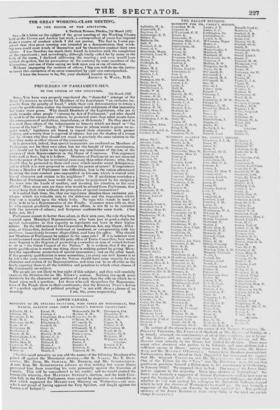PRIVILEGES OF PARLIAMENT-MEN.
TO THE EDITOR OP THE SPECTATOR.
7th March 1837.
San-You have very properly reprobated the " shameful " attempt of Sir Jou!: CAMPBELL to secure for Members of the Legislature "an exclusive im- ninuity from the penalty of fraud," while their own determination to retain a pop et!, qualification makes the inconsistency and unfairness of this immunity tell lilies more gross. Why should Members of the Legislature, who are so relay to make other people " virtuous by Act of Parliament," and who should be models of the virtues they enforce, be protected more than other people from the consequences of misfortune, imprudence, or dishonesty ? Do they stand in Ic-s need than others of the inducements to honesty which are found in " the tenors of the law?" Surely, if "from those to whom much is given we re- (wire much," legislators are bound to regard their character with greater jealousy and severity than is required of others; but not the shadow of a reason can lie shown why they should not stand in precisely the same relation to the lairs they make as other classes of the community. It is pretended, indeed, that special immunities are conferred on Members of P.olianient, not for their own sakes but for the benefit of their constituents, who should not be liable to be deprived, by any interference of the law!, of the services of their Representatives in the House of Commons. This argument looks well at first ; but it is hollow. Members of Parliament are not screened from the power of the law in criminal cases more than other classes; why, then, should they be protected in those civil cases which involve moral delinquency, and to which it is now proposed to confine the power of arrest? If imprudence brings a Member of Parliament, into difficulties, how is the nation advantag,ed by seeing the same conduct pass unpunished in his case, which is visited with loss of character and station in his neighbour ? Or if misfortune overtakes a Member of Parliament, how would the nation he prejudiced by his resigning his trust into the hands of another, and devoting his attention to his own affairs? How many men are there who would be missed from Parliament, that cannot keep their seats without the protection of special immunities? It is indeed high time, Sir, that our legislators abandon these exclusive pri- vileges. which are valuable only to the dishonest and the imprudent, whilst they east a scandal upon the whole body. No man who stands in need of them is fit to be a Representative of the People. Common sense tells us, that he who cannot prudently manage his own affairs, is not fit to be intrusted with the interests of others ; and Scripture confirmstbe same truth. (See Luke, xvi. 10.) Parliament cannot do better than adopt, in their own ease, the rule theyhave imposed upon Municipal Representatives, who have just as good a claim for special immunities in that capacity as legislators can have in their higher sphere. By the 52d section of the Corporation Reform Act, any Mayor, AK r- man, or Councillor, declared bankrupt or insolvent, or compounding with his creditors. immediately becomes disqualified, and loses his office. Why should not Members of Parliament be subject to the same rule? If it is indecent that an embarrassed man should hold the petty office of Town-Councillor, how much more flagrant is the disgrace of permitting a swindler or man of ruined fortune to sit in " the Great Council of the Nation." It is evident, that if the pro- perty qualification is worth any thing, there is nothing gained by giving Mem- bers the superfluous protection of special immunities; and on the other hand, if the property qualification is mere moonshine, (as every one well knows it to be, ) it is the more necessary that the Nation should have some security for the character and station of its Representatives, and none can be so effective as the freely exposing them to all the liabilities and penalties to which other classes of the community are subject. The people are not likely to lose sight of this subject ; and they will carefully examine the Division-list on Mr. TOOKE's motion. Nothing can speak more decisively for the character and position of a man than the side on which he is found upon such a question. Let those who call themselves the Representa- tives of the People show to their constituents, that Sir ROBERT l'EEI.'s fiction of "a perfect equality of political privilege" is not with them a phrase of no meaning. I am, Sir, yours respectfully, Z.


























 Previous page
Previous page